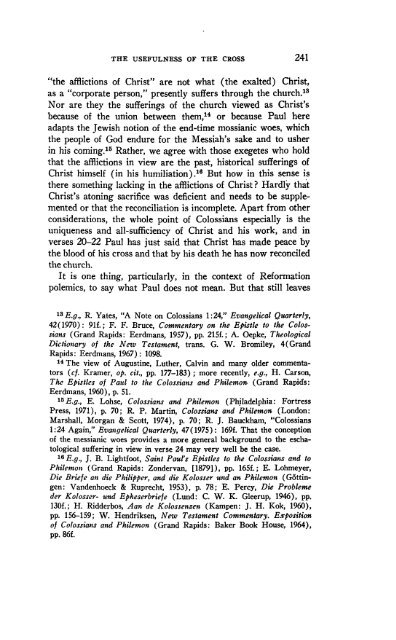NEW TESTAMENT THEOLOGY
Issues%20in%20New%20Testament%20Theology
Issues%20in%20New%20Testament%20Theology
Create successful ePaper yourself
Turn your PDF publications into a flip-book with our unique Google optimized e-Paper software.
THE USEFULNESS OF THE CROSS 241<br />
"the afflictions of Christ" are not what (the exalted) Christ,<br />
as a "corporate person," presently suffers through the church. 13<br />
Nor are they the sufferings of the church viewed as Christ's<br />
because of the union between them, 14 or because Paul here<br />
adapts the Jewish notion of the end-time mossianic woes, which<br />
the people of God endure for the Messiah's sake and to usher<br />
in his coming. 15 Rather, we agree with those exegetes who hold<br />
that the afflictions in view are the past, historical sufferings of<br />
Christ himself (in his humiliation). 16 But how in this sense is<br />
there something lacking in the afflictions of Christ ? Hardly that<br />
Christ's atoning sacrifice was deficient and needs to be supplemented<br />
or that the reconciliation is incomplete. Apart from other<br />
considerations, the whole point of Colossians especially is the<br />
uniqueness and all-sufficiency of Christ and his work, and in<br />
verses 20-22 Paul has just said that Christ has made peace by<br />
the blood of his cross and that by his death he has now reconciled<br />
the church.<br />
It is one thing, particularly, in the context of Reformation<br />
polemics, to say what Paul does not mean. But that still leaves<br />
13 E.g., R. Yates, "A Note on Colossians 1:24," Evangelical Quarterly,<br />
42(1970): 91f.; F. F. Bruce, Commentary on the Epistle to the Colossians<br />
(Grand Rapids: Eerdmans, 1957), pp. 215f. ; A. Oepke, Theological<br />
Dictionary of the New Testament, trans. G. W. Bromiley, 4(Grand<br />
Rapids: Eerdmans, 1967): 1098.<br />
14 The view of Augustine, Luther, Calvin and many older commentators<br />
(cf. Kramer, op. cit., pp. 177-183) ; more recently, e.g., H. Carson,<br />
The Epistles of Paul to the Colossians and Philemon (Grand Rapids:<br />
Eerdmans, 1960), p. 51.<br />
15 E.g., E. Lohse, Colossians and Philemon (Philadelphia: Fortress<br />
Press, 1971), p. 70; R P. Martin, Colossians and Philemon (London:<br />
Marshall, Morgan & Scott, 1974), p. 70; R. J. Bauckham, "Colossians<br />
1:24 Again," Evangelical Quarterly, 47(1975): 169f. That the conception<br />
of the messianic woes provides a more general background to the eschatological<br />
suffering in view in verse 24 may very well be the case.<br />
1Q E.g., J. B. Lightfoot, Saint Paul's Epistles to the Colossians and to<br />
Philemon (Grand Rapids: Zondervan, [1879]), pp. 165f. ; E. Lohmeyer,<br />
Die Briefe an die Philipper, and die Kolosser und an Philemon (Gôttingen:<br />
Vandenhoeck & Ruprecht, 1953), p. 78; E. Percy, Die Probleme<br />
der Kolosser- und Epheserbriefe (Lund: C. W. K. Gleerup, 1946), pp.<br />
130f.; H. Ridderbos, Aan de Kolossensen (Kampen: J. H. Kok, 1960),<br />
pp. 156-159; W. Hendriksen, New Testament Commentary. Exposition<br />
of Colossians and Philemon (Grand Rapids: Baker Book House, 1964),<br />
pp. 86f.


